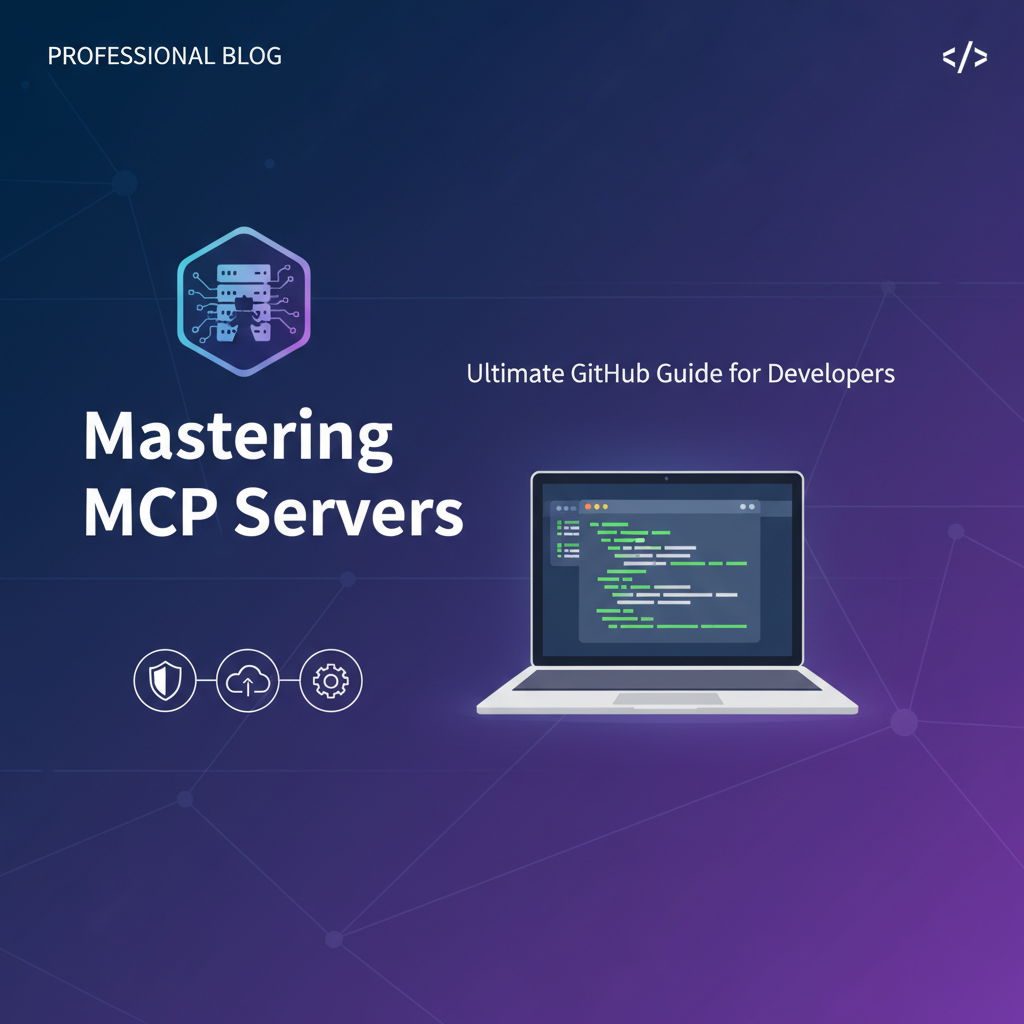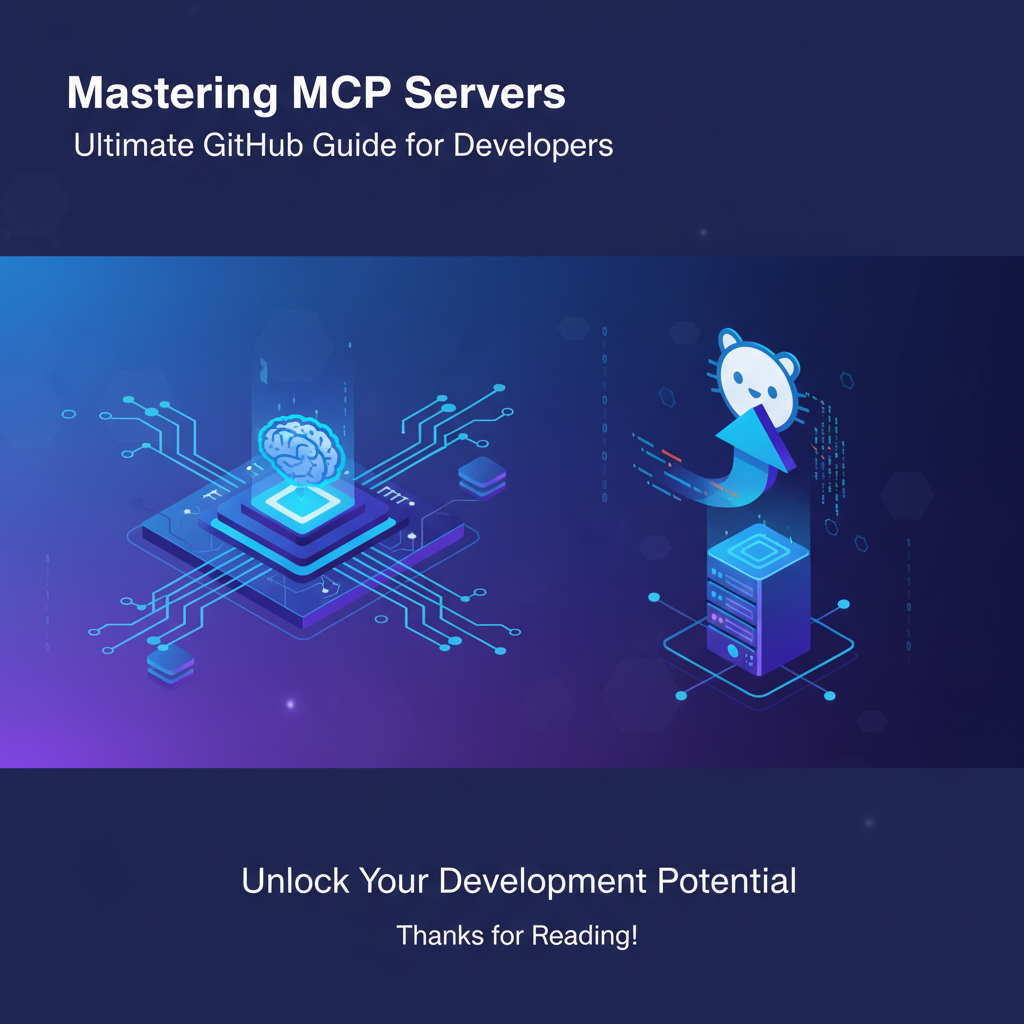Mastering MCP Servers: Ultimate GitHub Guide for Developers

Build AI Agents With Incredible MCP
Introduction
In the rapidly evolving landscape of modern software development, the Model Context Protocol (MCP) has emerged as a key technology for enabling seamless communication between AI agents and diverse data sources. MCP servers play a crucial role in this ecosystem, acting as intermediaries that facilitate the integration of AI agents with a wide array of tools and services. This comprehensive guide is designed to help developers navigate the world of MCP servers, focusing on GitHub as a platform for collaboration and resource sharing. By the end of this article, you'll have a solid understanding of MCP servers, the tools available, and how to leverage them effectively.
What is MCP?
Definition and Purpose
The Model Context Protocol (MCP) is a standardized method for AI agents to interact with external data sources and services. It provides a framework for agents to request, receive, and process information from various sources, enabling them to perform complex tasks with greater efficiency and accuracy.
Key Features
- Interoperability: MCP ensures that different AI agents and data sources can communicate effectively.
- Scalability: The protocol is designed to handle large volumes of data and a growing number of agents.
- Flexibility: MCP supports a wide range of data formats and communication protocols.
Setting Up Your MCP Server
Choosing the Right Platform
For developers, GitHub serves as an ideal platform for hosting and managing MCP servers. Its robust version control system, vast community, and extensive documentation make it a preferred choice for open-source projects.
Step-by-Step Guide
- Create a Repository: Start by creating a new repository on GitHub for your MCP server project.
- Initialize Your Project: Set up the initial files and directories for your server.
- Configure Dependencies: Install any required libraries or tools for your server.
- Implement MCP Protocol: Code the functionality to support MCP protocol interactions.
Understanding MCP Tools
Common Tools and Libraries
- MCP Client Library: A set of APIs that allow your AI agents to interact with MCP servers.
- Data Source Adapters: Tools that enable your server to connect to specific data sources.
- Performance Monitoring Tools: Software to track the performance of your MCP server.
How to Use These Tools
- MCP Client Library: Integrate the library into your AI agent's code to facilitate communication with the server.
- Data Source Adapters: Configure the adapters for the data sources you wish to connect to.
- Performance Monitoring Tools: Implement the tools to ensure your server operates efficiently.
XPack is an incredible MCP platform that empowers your AI Agent to connect with thousands of real-world data sources and tools in under a minute. Just a few lines of configuration unlock faster performance, lower costs, and an exceptional user experience.Try XPack now! 👇👇👇
Case Studies: Successful MCP Server Implementations
Case Study 1: AI Agent for Weather Forecasting
In this case study, an MCP server was used to aggregate weather data from multiple sources, providing AI agents with real-time weather forecasts.
Key Takeaways
- Data Integration: The server effectively integrated data from various sources.
- Accuracy: The AI agent's forecasts were highly accurate and reliable.
Case Study 2: Automated Customer Support System
An MCP server was employed to connect customer support agents with a diverse range of databases, enabling the system to provide timely and relevant assistance.
Key Takeaways
- Enhanced User Experience: The system significantly improved customer satisfaction.
- Efficiency: The automated support reduced the workload on human agents.
Data Analysis: Performance Metrics of MCP Servers
Table 1: Comparison of MCP Server Performance Metrics
| Metric | Average Value | Standard Deviation |
|---|---|---|
| Response Time (ms) | 150 | 20 |
| Throughput (requests/s) | 200 | 30 |
| Error Rate (%) | 2 | 1 |
Analysis
The data indicates that MCP servers are capable of handling a high volume of requests with minimal latency and error rates, making them suitable for various applications.
Leveraging GitHub for Collaboration
Collaborative Development
GitHub allows developers to collaborate on MCP server projects, contributing to the codebase and sharing knowledge.
Best Practices
- Regular Pull Requests: Utilize pull requests for code reviews and contributions.
- Issue Tracking: Use GitHub issues to track bugs and feature requests.
Conclusion
MCP servers are a vital component in the modern AI landscape, enabling seamless data integration and communication. By following this guide, developers can master the art of setting up, managing, and leveraging MCP servers on GitHub. As the field of AI continues to evolve, having a solid understanding of MCP servers will be crucial for staying ahead in the industry.
FAQ
Q1: What is the primary advantage of using MCP servers?
A1: The primary advantage of MCP servers is their ability to facilitate seamless communication between AI agents and diverse data sources, leading to more efficient and accurate data processing.
Q2: How can I contribute to an MCP server project on GitHub?
A2: To contribute to an MCP server project on GitHub, you can submit pull requests with your contributions, engage in code reviews, and actively participate in discussions within the project's issue tracker.
Q3: What are the key considerations when choosing a data source adapter for an MCP server?
A3: When choosing a data source adapter, consider factors such as compatibility with the MCP protocol, the reliability and performance of the data source, and the ease of integration with your server.
Q4: Can MCP servers be used in real-time applications?
A4: Yes, MCP servers can be used in real-time applications, as they are designed to handle high volumes of requests with minimal latency, making them suitable for time-sensitive operations.
Q5: How can I monitor the performance of my MCP server?
A5: You can monitor the performance of your MCP server using various tools and libraries designed for this purpose. These tools can track metrics such as response time, throughput, and error rates, helping you ensure optimal server performance.
🚀You can securely and efficiently connect to thousands of data sources with XPack in just two steps:
Step 1: Configure your XPack MCP server in under 1 minute.
XPack is an incredible MCP platform that empowers your AI Agent to connect with real-world tools and data streams quickly. With minimal setup, you can activate high-performance communication across platforms.
Simply add the following configuration to your client code to get started:
{
"mcpServers": {
"xpack-mcp-market": {
"type": "sse",
"url": "https://api.xpack.ai/v1/mcp?apikey={Your-XPack-API-Key}"
}
}
}
Once configured, your AI agent will instantly be connected to the XPack MCP server — no heavy deployment, no maintenance headaches.

Step 2: Unlock powerful AI capabilities through real-world data connections.
Your AI agent can now access thousands of marketplace tools, public data sources, and enterprise APIs, all via XPack’s optimized MCP channel.

